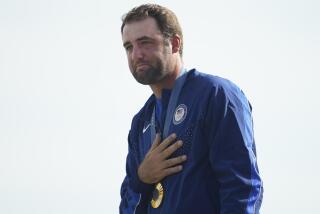Winning the men’s Olympic downhill can be an uphill battle
- Share via
Reporting from Whistler, Canada — The list of men who have won the coveted Olympic downhill crown is nearly as impressive as the list of men who haven’t.
Hermann Maier, the Austrian known as the “Herminator,” claimed 54 World Cup victories in his illustrious career. But he never snared the big one, although he almost died trying at the 1998 Nagano Games.
Marc Giradelli, representing tiny Luxembourg, won five World Cup overall titles but never gold in downhill.
Bode Miller, the greatest male skier in U.S. history, has been downhill-denied, as was Daron Rahlves, the former U.S. ski team star who won more World Cup downhills, nine, than any other American male.
The Olympic downhill has a history of surprises, including what day it will actually be staged.
At the 1998 Nagano Games, the race was scheduled for Feb. 8 but didn’t go off until Feb. 13.
What day this year’s Olympic downhill at Whistler gets out of the gate is still anyone’s guess.
The race is scheduled for Saturday, but hold off on that early cowbell wake-up call. It rained nearly all day Friday, and the weekend forecast is not good.
What’s an Olympic downhill without a little fog, mystery, intrigue and “say who?” as your winner.
You may recall Bill Johnson’s stunning victory at Sarajevo in 1984. It was stunning, even though the cocky Johnson predicted before the race that everybody else was skiing for second.
Tommy Moe, who never won a World Cup downhill, shocked the world when he captured the Olympic gold at the 1994 Lillehammer Games.
At the 1998 Nagano Games, a French veteran named Jean Luc Cretier took gold when he outwitted the field by playing it safe around treacherous Gate No. 7.
Four years ago, in Sestriere, Frenchman Antoine Deneriaz denied the likes of Miller and Maier with his remarkable, if not convincing, upset victory.
What is it about the Olympics?
“For just that one day, it’s really the guy who can get the breaks and get himself fired up for that one day,” said Marco Sullivan, who earned one of four U.S. slots for this year’s race. “That might be different for a guy who is consistently strong all season.”
You may have heard this: Anything can happen in ski racing. The weather can change during the race, altering the whole course dynamic.
The Olympic field is thinner, too, as each country can enter only four racers. Austria has to leave home guys who, given a chance, could win.
“Part of it is the seeding,” Miller said. “We use World Cup seeding here, but there’s a whole bunch of guys missing out of the first group, so guys who don’t normally have a great start position, here, sometimes at the Olympics, they get a perfect position.”
Four years ago, under old rules, France’s Deneriaz did what the top racers vowed never to do: win the final downhill training run. Back then, the downhill start list went in reverse order of the training run, so the favorites usually sandbagged to get a more favorable bib number. No one wants to race late on a track rutted out by other skiers.
Deneriaz did win the training run, though, and won the downhill from the back of the pack.
Go figure.
Four Olympic downhill champions since 1984 -- Johnson, Moe, Cretier and Deneriaz -- combined for 12 career World Cup victories.
That’s fewer than half of the 29 World Cup victories won by Austria’s Stephan Eberharter, who never won the Olympic downhill.
There never seems to be sure bets in this event -- and this year’s race on the Dave Murray Downhill course shouldn’t be any different.
Logic dictates it might be one of the “Canadian Cowboys,” because Whistler is their home course. You couldn’t go wrong guessing Manuel Osborne-Paradis, Robbie Dixon or Erik Guay.
Do they have an advantage?
“Of course,” said American Ted Ligety, the defending Olympic champion in combined. “They were training here two weeks ago.”
It also helps the Canadians that the rest of the field, because of poor weather conditions, got in only one official training run.
Other safe bets would your choice of Swiss: Didier Cuche or Carlo Janka.
Cuche, last month, won the most famous downhill on the World Cup circuit: the Hahnenkamm in Kitzbeuhel.
It wouldn’t be wise, either, to bet against Miller, who may have something to prove after his fiasco of four years ago.
Or you could close your eyes and point to a name on the training-run list.
David Poisson, born in 1982, a no-name from France.
Why not?
More to Read
Go beyond the scoreboard
Get the latest on L.A.'s teams in the daily Sports Report newsletter.
You may occasionally receive promotional content from the Los Angeles Times.







